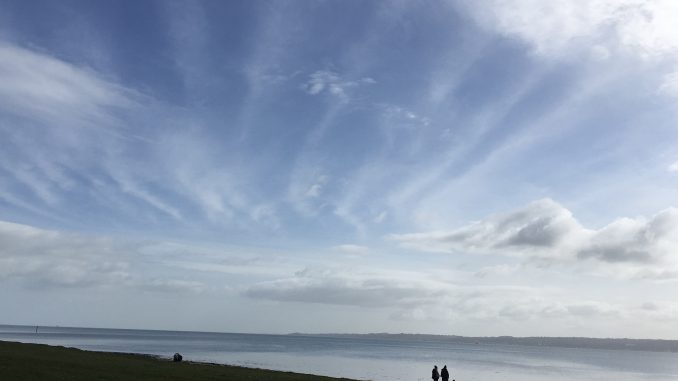
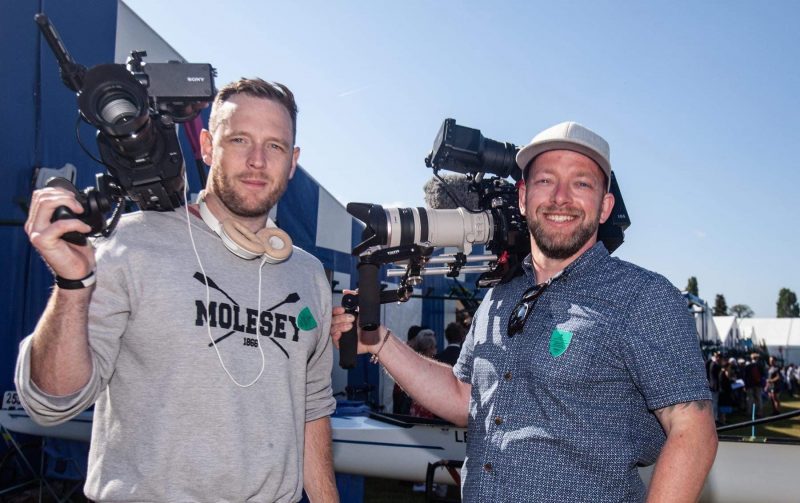
Like many young men, Adam Heayberd didn’t rate school – it didn’t offer much excitement, his heart lay in sport and he was good at it. Something of a water baby he was devoted to skimming the Lagan in a light weight boat, rowing for his school and later for Ireland. But his lack of involvement in class was noticed, at 14 years of age he faced having to leave Methodist College in Belfast to finish his education elsewhere.
“Then the rowing coach sat me down on the steps at the boat house and said: “I need you, get back to your class room and pull your finger out”. Mr Thompson’s words hit home. “I went back to school and got my exams all because of my love of rowing.”
And he proved he had what it takes to succeed, stamina, reliability, enthusiasm. For instance, ten years ago he was one of six who broke the world record for swimming the entire length of Upper and Lower Lough Erne, 48 miles in 19 hours and six minutes, breaking the existing record by over three hours.
Time To Move On
It’s not surprising that Adam ended up working in television. He was always in and around theatres and studios as his late mother Maureen Thornton was an actress and his dad Roy Heayberd a theatre and a television director but the stage wasn’t of interest to their son, it was the workings that went on behind the scenes.
Having learned his craft as a TV cameraman with various production companies, he developed his editing skills and has worked his way up to his current position as a freelance in great demand.
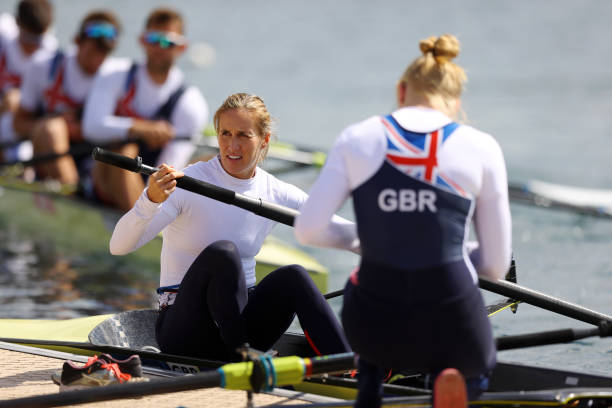
He edited the recent BBC programme The Mother of All Comebacks featuring rower Helen Glover’s challenges as she determined to come out of retirement, organise three small children and compete at Tokyo. Adam’s pictures gave an insight into the stresses she went through to achieve her goal.
Although he has traveled the world filming and editing for news programmes, sport has always been his preference and his intention was to chart the progress of the GB Rowing team as they prepared for the Olympics.
The Dream Came True
Over the last couple of years he nurtured his unique project, writing, filming, editing and sourcing the finance. Meticulous planning got underway, crews in place and the rowing fraternity excited and wiling to get going.
Then tragedy struck – Covid 19.
Everything went on hold except Adam’s cameras as he reflected heart breaking challenges of those times, the apparent retirement of their long term coach, the personalities going through those dark days, Helen Glover, the flag bearer Mohamed Sbihi, a young women studying for a medical degree who gave up rowing to nurse in Covid wards and two girls from Northern Ireland, 27 year old Rebecca Shorten from Belfast who struggled to keep her seat and like so many others built a makeshift gym in the kitchen to continue training, to keep her muscle strength and it worked! Months later we see her cry in her car when she answered her mobile to hear she was on her way to Tokyo. Rebecca Edwards, also 27, went home to the family farm in Co. Armagh upset that she had failed in her initial bid to be on the GB team. However, with a year’s postponement she was able to work hard in her home gym and eventually was chosen to join the squad.
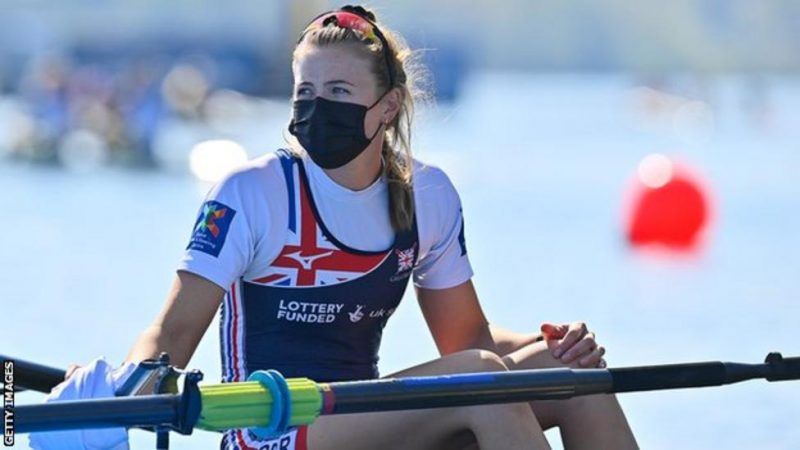
The three part documentary leaves you in no doubt that being an elite athlete is a huge task both physically and mentally and to loose out on medals is nothing short of a tragedy. The programmes are emotional too, the sheer determination and guts required by the men and women and the mixed team of the para Olympians. Adam has caught every aspect of the training, the interaction between coaches, the cox, the rowers, often collapsing with sheer exhaustion. The raunchy music that introduces the programmes draws you into 23 months of preparation: ‘Another day another mile …’
It’s obvious that these programmes have been made by someone who cares, has the experience, has the trust of the squad and shares their ethos of eat, sleep, row – repeat.
Despite the outcome which was terribly disappointing, Adam has made a documentary that rowers, both club and elite, would feel represented their sport. He charted the subject right up to but not including the Tokyo games which end today.
“I’m delighted the squad watched it in Tokyo and loved it. Also I wanted non-rowers, especially young people, to watch and get what the sport is about. looking past the stereotypes and realising exactly what rowers go through in order to succeed and to finally understand why such sacrifices are made.”
For the last two weeks Adam was editing pictures from Tokyo for BBC and many thousands of us enjoyed the ultimate in viewing excitement every day thanks to this young man from Strangford. Mr. Thompson would be proud!
The Road to Tokyo
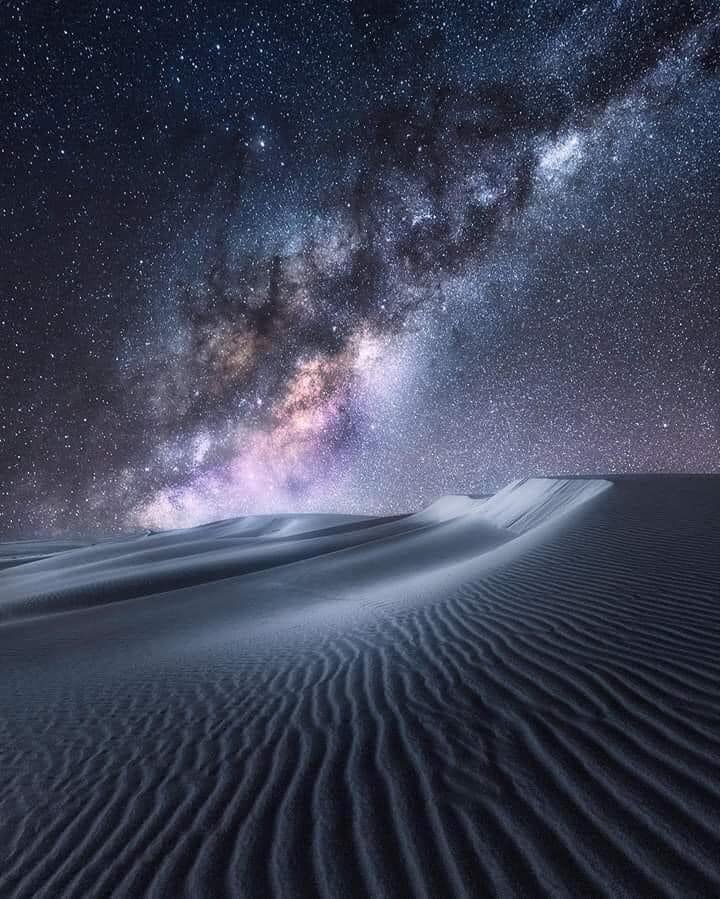
Look out for shooting stars this week. This article is from the Irish Astronomical Association.
Thanks to Terry Moseley for this important and interesting information.
MAJOR METEOR SHOWER BEGINS
“The annual Perseid Meteor shower is one of the two best each year, and this year conditions are favourable, with no bright moonlight to spoil the show.
Meteors, often called Shooting Stars or Falling Stars, are just tiny bits of debris in space which plough into our atmosphere at very high speed and ‘burn away’ in a streak of light lasting just a second or so.
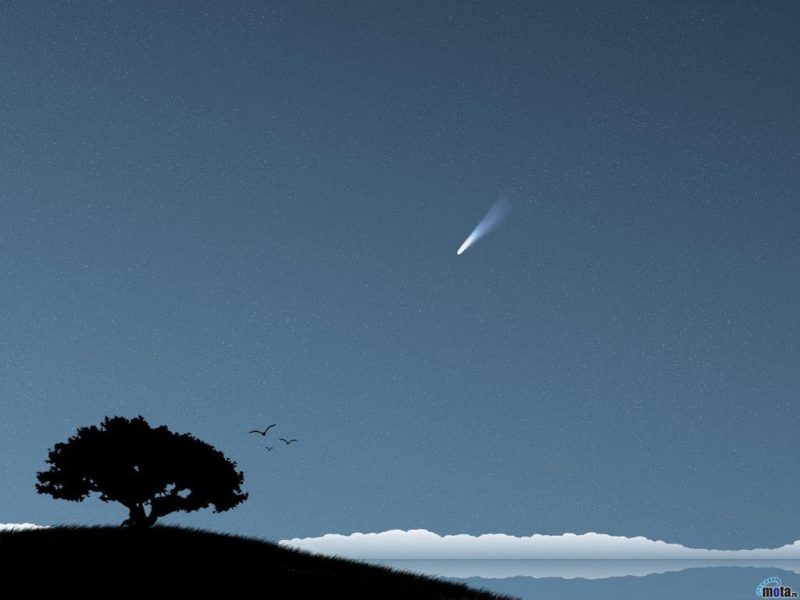
Most of the annual meteor showers are caused by streams of tiny particles emitted from comets as they orbit around the Sun, and the Perseids originate from Comet Swift-Tuttle, named after the two astronomers who discovered it. The Earth passes through this shower of tiny particles each August, with the maximum occurring on the night of August 11-12th, and especially 12-13th, when up to 80 meteors per hour can be observed under ideal conditions in the early hours of the 13th. However, some Perseids can be seen from the beginning of the month up to about the 20th, although the rates are much lower the further away from the date of maximum.
They are called Perseids because they all seem to come from a point in the sky in the constellation of Perseus. They can appear anywhere in the sky, at random, but if you trace the direction of their tracks backwards, they will all appear to come from a small area in Perseus, which lies along the Milky Way.
Perseus will be rising in the North East when the sky gets dark, and the number of meteors seen will increase from then as Perseus gets higher up in the East and then almost overhead, until dawn twilight gets too bright.
The young crescent Moon will set as twilight ends, so moonlight will not interfere this year.
You don’t need a telescope, or even binoculars, to see them, just your own eyes. But you must allow time for your eyes to adapt to the darkness before you’ll start to see any: if going out from a bright room, this takes 10 minutes for a reasonable view, but around 20 minutes to get the best view. For comfort, use a reclining chair or lounger, and wrap up well as it will get quite cool after a while.
And you should try to observe from the darkest location possible, away from light pollution, i.e. the effects of bright city lights, or even nearby street lights or security lights. If you can see the Milky Way, you’ve got a reasonably good location. The new OM/Davagh Dark Sky Park in the Sperrins is being developed for observing events such as this.
Although they appear to come from Perseus, they can appear anywhere in the sky, and the best place to look is about 50 degrees above the horizon (a bit more than halfway up to the overhead point, and about the same distance to left or right of the radiant, in whichever direction you can get the clearest and darkest view. Obviously if it’s cloudy, you won’t see any, but if you look on the few nights on either side of the 12th/13th, you should still see quite a good display if it’s clear then.
Perseid meteors are fast, as they collide with Earth at a speed of almost 60 km per second. There are a good proportion of bright ones, although as with all showers, there are many more faint ones than bright ones. That’s why you’ll see more from a very dark site, and when your eyes have fully dark-adapted.”
GONE BUT NOT FORGOTTEN

Now that the Olympics are over – and I for one thought they were terrific – the night sky will be a joy to observe next week. Surely one of the nights will be cloudless or am I just an optimist!
There’s criticism about the mix of amateur and professional men and women performing in Tokyo, I wonder is there such a thing as a true amateur any more. Such is the way of the world these athletes need support and sponsorship to enable them to attain a high standard.
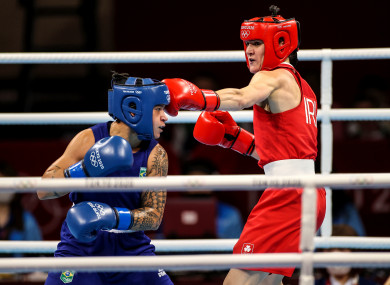
And what a terrific conclusion to Kellie Harrington’s journey through the stages of her boxing bouts having defeated Brazilian Beatriz Ferreira this morning. And isn’t Steve Bunce a brilliant commentator on radio.
Now just the closing ceremony to look forward too.

